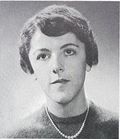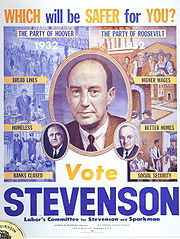Every President has their own leadership style. But there are a limited number of styles and so historians quickly detect patterns as a new President takes office.
The pattern of this President is becoming clear.
It's that of Adlai Stevenson.
This is no surprise. Stevenson (who despite the headline was never President) was the political hero of Stanley Ann Dunham, Obama's mother, during her Seattle girlhood.
It's not just that Stevenson and Obama both call Illinois home. It is their technocratic approach, based on the idea that people who know stuff can come to a consensus which may not lead to a perfect policy but the best possible answer in the moment.
There are differences. Obama came from another world, from Hawaii, while Stevenson seemed born to rule. Stevenson's grandfather was a Vice President, and his son was later a Senator. Obama's father was a Kenyan technocrat from the Stevenson era, his grandfather a salesman.
Unfortunately Stevenson came to prominence as voters were souring on Harry Truman (and by extension the Democratic Party). He lost because General Eisenhower was popular but also because Eisenhower accepted the Roosevelt era assumptions, promising only to moderate the New Deal, not repeal it. Eisenhower, in other words, was an acceptable Anti-Thesis to the Roosevelt Thesis of Unity.
The Obama process is Stevensonism personified:
- Act, don't react. Define the debate by constantly moving.
- Provide a policy framework. This is his thesis, based on his having been elected.
- Bring together the best experts and let them offer alternatives. Those that moderate his thesis may be accepted, as an acceptable anti-thesis.
- Seek validation for the resulting compromise through Congress, emphasizing the urgency of action.
- Find honest and able people to administer the policy that results.
- Use the Internet both to deliver details and communicate directly with voters.
Notice how this replicates much of what I've been talking about as the pattern of American political history. There's a Thesis, an Anti-Thesis, and validation of the Thesis. The medium of the Internet is used to avoid excess, to keep everyone grounded, and to give individuals greater control of the process. It builds consensus, just as the standards bodies of the Internet build an elite consensus.
There are certain assumptions in this governing style.
- Most people are intelligent and come to the debate with goodwill.
- People come to the debate as individuals, not through groups.
- Lobbyists are heard based on the ideas they present, and must then choose whether to oppose the result of the process.
- Policy can be edited. Ideas are a guideline but ideals are not the final word.
These are all straight from Stevenson. They are middle class, they are the earnest ideals of 1950s liberalism. As Stevenson himself said in accepting the 1952 Democratic nomination:
President Obama is saying many of the same things, only he's saying them better.
To this, of course, we have to add Obama's own political talents, his charisma, his speaking style, his story. All these elements are meant to make him appear an honest broker of events and, so far, it's working a treat. The President is lifting his whole party with him, and by rejecting his thesis outright (rather than leaning on it as an anti-thesis must) the Republicans are falling.
The President benefits from his place on the larger calendar. At a time of crisis, a President who offers a new vision and a new style is always given the benefit of the doubt. Nixon was, FDR was, McKinley was, Lincoln was, and Jackson was.
Stevenson's fate was sealed by the time he came up in, the environment George H.W. Bush faced against Bill Clinton, what President Taft faced against Wilson and Roosevelt, what James G. Blaine faced against Grover Cleveland, what Van Buren faced against William Henry Harrison. Notice that most of these were incumbents. Stevenson, in other words, was forced to run as an incumbent when the incumbent thesis was broken.
President Obama's first best-seller was "Dreams from my Father." His presidency is based on acting out the dreams of his mother.











